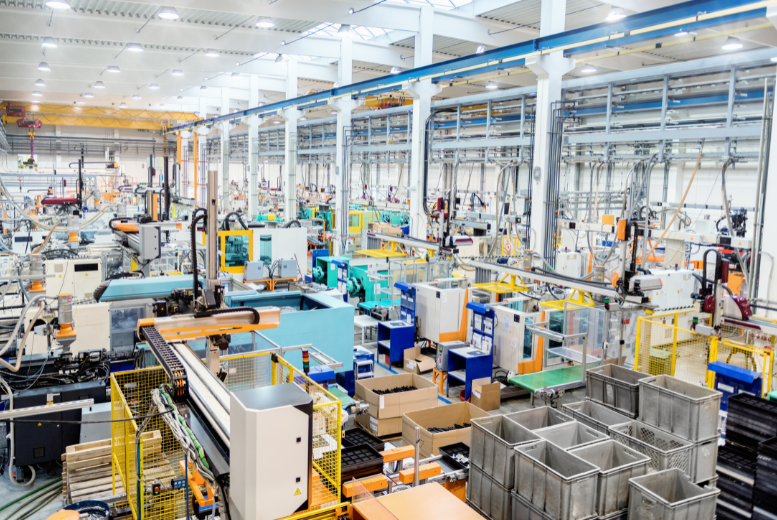
A boiler is a closed vessel that heats water to produce steam. Steam is used in a variety of industrial processes, including heating, power generation, and manufacturing. Boilers can be powered by a variety of fuels, including coal, natural gas, oil, and biomass. There are many different manufacturers of boilers for manufacturing. Some of the leading American manufacturers include Hurst Boiler, Cleaver-Brooks, and Aalborg. These manufacturers offer a wide range of boilers to meet the needs of different industries. Boiler efficiency is an important consideration for manufacturers. Efficient boilers can save money on fuel costs and reduce emissions. There are a number of ways to improve boiler efficiency, including using high-quality materials, proper installation, and regular maintenance.
The Importance of Boilers in Manufacturing
A boiler is a critical piece of equipment in many manufacturing facilities. Boilers provide heat for a variety of processes, including:
- Heating water for cleaning and sterilization
- Generating steam for power and heat
- Drying materials
- Melting metals
- Cooking food
Boiler efficiency is important for manufacturers because it can save money on fuel costs and reduce emissions. Efficient boilers can also improve the quality of products by providing a more consistent temperature.
American Boiler Manufacturers
There are many American boiler manufacturers that offer a variety of boilers to meet the needs of different industries. Some of the leading American boiler manufacturers include:
- Hurst Boiler
- Cleaver-Brooks
- Aalborg
- Foster Wheeler
- Babcock & Wilcox
These manufacturers offer a wide range of boilers, including water tube boilers, fire tube boilers, and packaged boilers. Water tube boilers are typically used for high-pressure applications, while fire tube boilers are typically used for low-pressure applications. Packaged boilers are pre-assembled and ready to install, which can save time and money.
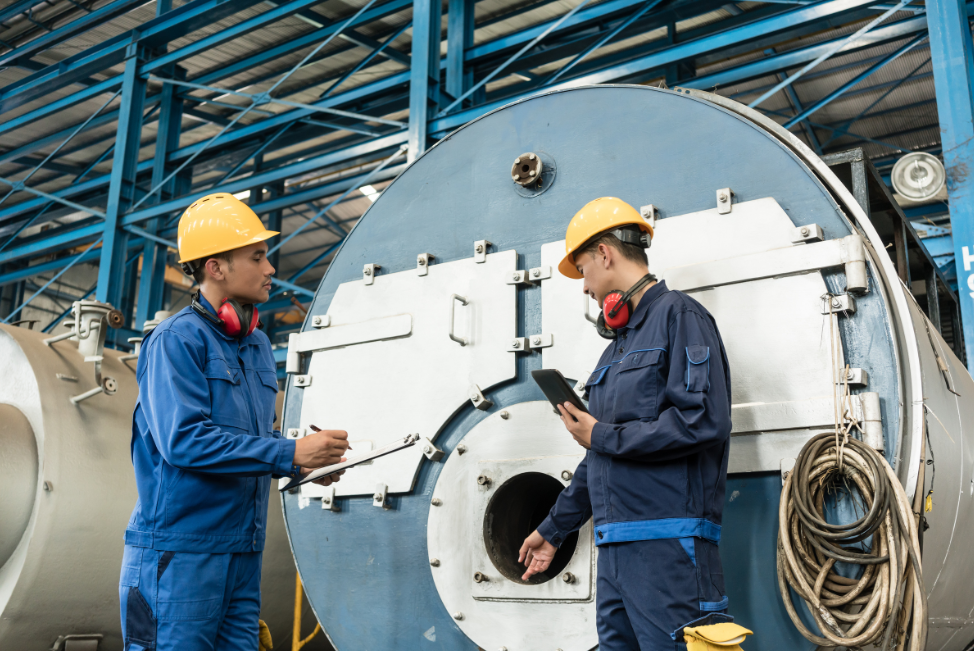
Boiler Efficiency
Boiler efficiency is an important consideration for manufacturers. Efficient boilers can save money on fuel costs and reduce emissions. There are a number of ways to improve boiler efficiency, including:
- Using high-quality materials
- Proper installation
- Regular maintenance
High-quality materials, such as stainless steel, can help to improve boiler efficiency by resisting corrosion and heat damage. Proper installation is important to ensure that the boiler is operating at its optimal efficiency. Regular maintenance, such as cleaning and inspecting the boiler, can help to prevent problems and improve efficiency.
A Boiler is a vital piece of equipment for many manufacturing facilities. Boilers provide heat for a variety of processes, which can save money and improve the quality of products. Boiler efficiency is important for manufacturers, and there are a number of ways to improve boiler efficiency.
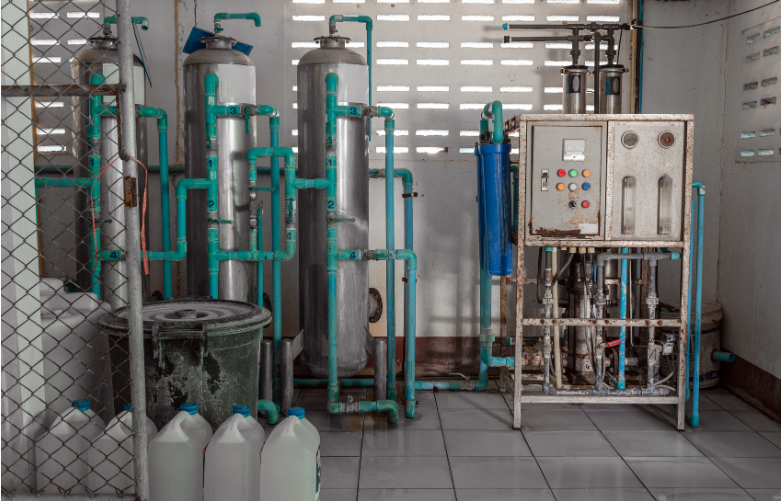
Boosting Manufacturing Efficiency: The Power of Boilers for American Manufacturers
In the fast-paced world of manufacturing, efficiency is key. As manufacturers strive to meet increasing demands while maintaining high-quality standards, finding reliable and efficient solutions becomes paramount. Among the array of technologies available, boilers have emerged as a critical component for powering manufacturing processes across various industries. With a focus on American manufacturers, this article explores the significance of boilers in enhancing operational efficiency and productivity.
Boilers have long been recognized as indispensable tools in the industrial landscape, providing a reliable source of heat or steam to facilitate numerous manufacturing operations. Whether it’s generating heat for space heating or steam for powering machinery and equipment, boilers play a crucial role in supporting a wide range of manufacturing processes. From food and beverage production to chemical manufacturing, and from paper mills to textile factories, boilers have found their place at the heart of the industry.
For American manufacturers, investing in efficient boiler systems offers a myriad of benefits. Not only do these systems provide the necessary heat and steam required for various manufacturing processes, but they also contribute to reducing energy consumption and optimizing overall operational efficiency. As sustainability and environmental concerns take center stage, manufacturers are actively seeking energy-efficient solutions to meet their production needs while minimizing their carbon footprint.
Efficiency is a critical factor when evaluating boiler systems for manufacturing purposes. The efficiency of a boiler refers to its ability to convert fuel into usable heat or steam with minimal waste. Modern boiler technologies have made significant strides in improving efficiency, allowing manufacturers to achieve substantial cost savings and reduce their environmental impact simultaneously. By maximizing fuel utilization and minimizing heat losses, advanced boiler systems ensure that manufacturers extract the most value from their energy resources.
In addition to efficiency, American manufacturers also prioritize reliability and safety when selecting boiler systems. Downtime can have severe consequences, leading to production delays, financial losses, and reputational damage. Therefore, manufacturers seek reliable boiler solutions that offer consistent performance, minimize maintenance requirements, and adhere to stringent safety standards.
Boilers play a vital role in the manufacturing industry, serving as a reliable source of heat and steam to power various processes. For American manufacturers, investing in efficient boiler systems not only enhances operational efficiency but also aligns with sustainable practices and reduces energy consumption. By choosing reliable and safe boiler solutions, manufacturers can ensure uninterrupted production and drive productivity. As the manufacturing landscape continues to evolve, boilers remain a fundamental tool, empowering American manufacturers to thrive in an increasingly competitive global market.
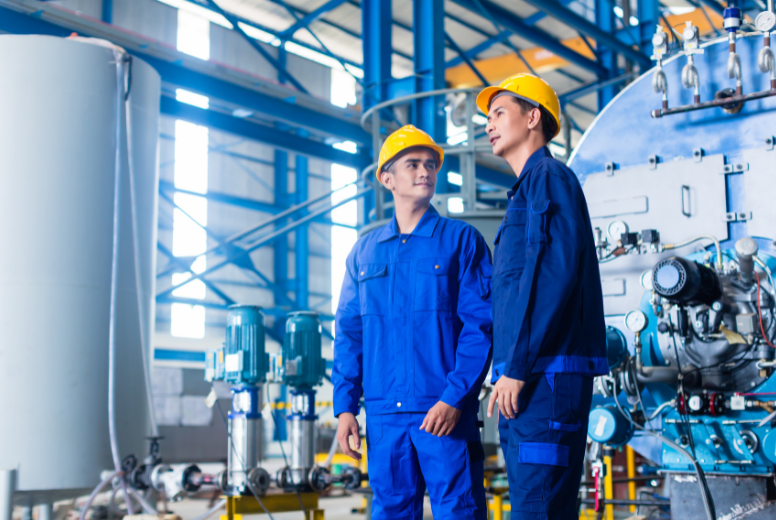
Enhancing Commercial Operations with Water Heaters in Boiler Manufacturing
Water heaters play a vital role in commercial boiler manufacturing, catering to the specific needs of businesses and industries. In this section, we delve into the importance of water heaters in commercial settings, examining their relevance to manufacturers, control features, and the benefits they bring to businesses.
For manufacturers serving the commercial sector, the integration of water heaters into boiler systems is crucial. Commercial establishments such as hotels, hospitals, restaurants, and manufacturing facilities often have demanding hot water requirements for various processes, including sanitation, cleaning, and heating. By incorporating water heaters into their boiler systems, manufacturers can offer comprehensive solutions that meet the diverse needs of commercial customers, providing them with reliable and efficient hot water on demand.
Control features are of utmost importance in commercial boiler manufacturing, where precise temperature control and system monitoring are vital. Manufacturers strive to design water heaters with advanced control capabilities that allow commercial users to optimize their hot water usage, adjust temperatures based on specific requirements, and monitor energy consumption. User-friendly interfaces, remote access options, and intelligent control algorithms enable businesses to fine-tune their hot water systems for maximum efficiency, reducing waste and saving operational costs.
The integration of water heaters into commercial boiler systems brings numerous benefits to businesses. First and foremost, it ensures a consistent and reliable supply of hot water, critical for day-to-day operations. From kitchen operations to laundry facilities and heating in commercial spaces, businesses rely on hot water for their essential activities. By providing a dependable source of hot water, water heaters in commercial boiler systems contribute to uninterrupted operations and enhanced productivity.
Energy efficiency is another significant advantage offered by water heaters in commercial boiler manufacturing. High-efficiency water heaters help businesses minimize energy consumption, leading to cost savings and reduced environmental impact. By optimizing fuel utilization and minimizing heat losses, advanced water heaters enable commercial establishments to achieve substantial energy savings while meeting their hot water demands.
Moreover, water heaters integrated into commercial boiler systems often come with advanced safety features and robust construction to withstand the demands of commercial use. Manufacturers prioritize durability, reliability, and compliance with industry regulations to ensure safe and trouble-free operations for businesses.
Water heaters play a crucial role in commercial boiler manufacturing, meeting the hot water demands of various businesses and industries. With advanced control features, they enable businesses to optimize their hot water systems, monitor energy usage, and achieve greater operational efficiency. The benefits of water heaters in commercial settings include uninterrupted operations, cost savings through energy efficiency, and enhanced safety measures. By incorporating water heaters into their boiler systems, manufacturers provide businesses with comprehensive solutions that cater to their specific hot water needs, empowering commercial establishments to thrive in their respective industries.
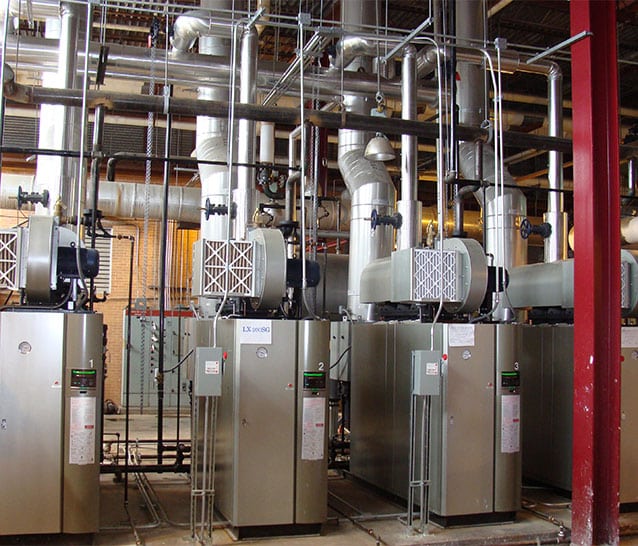
Empowering the American Manufacturing Industry with Steam Boilers
The manufacturing industry is the backbone of economic growth, job creation, and technological advancements in the United States. In this section, we explore how steam boilers, a key component in industrial manufacturing, contribute to the success of American businesses and the overall growth of the industry.
Steam boilers have long been recognized as indispensable assets in the manufacturing sector. They serve as reliable sources of high-pressure steam, which is utilized in various manufacturing processes such as heating, sterilization, drying, and power generation. American manufacturers rely on steam boilers to provide the necessary energy for their operations, enabling them to produce goods efficiently and maintain stringent quality standards.
The American manufacturing industry has a rich history of innovation and technological advancements, and steam boilers have played a significant role in this progress. With advancements in boiler design and efficiency, manufacturers have been able to optimize their production processes, reduce energy consumption, and enhance operational efficiency. These benefits are critical for American businesses as they strive to remain competitive in a global market.
One of the key advantages of steam boilers in manufacturing is their versatility. Steam can be used in a wide range of industrial applications, making it a flexible and efficient heat transfer medium. Whether it’s providing heat for chemical reactions, powering turbines for electricity generation, or enabling precise temperature control in food processing, steam boilers offer a reliable and customizable solution for diverse manufacturing needs.
Moreover, steam boilers contribute to the overall sustainability and environmental performance of the American manufacturing industry. As energy efficiency and carbon footprint reduction become increasingly important, manufacturers are investing in high-efficiency steam boilers that optimize fuel utilization and minimize emissions. By adopting clean and efficient steam boiler technologies, American businesses can align their manufacturing processes with sustainable practices while minimizing energy costs.
In addition to their role in energy efficiency, steam boilers also enhance the safety and reliability of manufacturing operations. Modern steam boilers are designed with advanced control systems and safety features to ensure stable and safe steam generation. Manufacturers prioritize compliance with stringent industry standards and regulations to provide businesses with reliable and secure boiler systems.
The American manufacturing industry is known for its resilience, adaptability, and commitment to innovation. Steam boilers are a testament to this spirit, serving as critical assets that empower American manufacturers to produce high-quality goods efficiently. By investing in steam boiler technologies, American businesses gain a competitive edge, improve productivity, and contribute to the growth of the industry.
Steam boilers play a vital role in the American manufacturing industry, providing reliable and efficient steam generation for various manufacturing processes. With their versatility, energy efficiency, and emphasis on safety, steam boilers enable American businesses to meet production demands, optimize operational efficiency, and reduce environmental impact. As the manufacturing landscape continues to evolve, steam boilers remain a cornerstone of the industry, driving the success and innovation of American businesses.
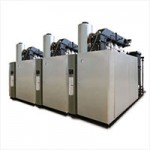
Designing Efficient Industrial Steam Boilers and Water Heaters
Efficiency is a critical factor in the design of industrial steam boilers and water heaters. In this section, we explore the importance of design considerations in maximizing the efficiency of these vital components, enabling manufacturers to optimize energy usage and enhance overall operational performance.
Industrial steam boilers and water heaters are complex systems that require meticulous design to achieve high efficiency. Design engineers take into account various factors such as heat transfer, combustion efficiency, system controls, and overall system integration to ensure optimal performance.
One key aspect of efficient design is maximizing heat transfer within the boiler or water heater. Heat transfer efficiency is crucial as it directly impacts the system’s ability to convert fuel energy into usable heat or steam. Design engineers employ advanced heat transfer technologies such as improved heat exchanger surfaces, enhanced combustion chambers, and optimized flow paths to enhance heat transfer rates and minimize energy losses.
Another vital consideration in the design of industrial steam boilers and water heaters is combustion efficiency. Efficient combustion involves the precise mixing of fuel and air, ensuring complete combustion and minimal waste. Design engineers employ techniques such as staged combustion, flue gas recirculation, and advanced burner designs to achieve high combustion efficiency, resulting in reduced fuel consumption and lower emissions.
System controls and integration play a crucial role in optimizing the efficiency of industrial steam boilers and water heaters. Advanced control systems enable precise monitoring and modulation of various operating parameters such as fuel flow, air-to-fuel ratio, and water temperature. This level of control ensures that the system operates at peak efficiency across varying load demands, minimizing energy wastage during low-demand periods. Additionally, integrating the boiler or water heater system with other industrial processes allows for energy recovery and further optimization of overall operational efficiency.
Design considerations for industrial steam boilers and water heaters also encompass thermal insulation and heat recovery. Effective insulation reduces heat losses and improves energy efficiency by minimizing the amount of heat dissipated to the surroundings. Heat recovery systems capture waste heat from the flue gases or hot water streams and utilize it for preheating incoming water or other process requirements. By integrating such heat recovery mechanisms, design engineers maximize the utilization of available energy, enhancing overall system efficiency.
Furthermore, the selection of high-quality materials and robust construction methods is essential in the design of industrial steam boilers and water heaters. Durable materials and proper construction ensure system longevity, minimize maintenance requirements, and reduce the risk of heat loss or system failure.
In conclusion, the design of industrial steam boilers and water heaters is a crucial aspect of achieving optimal efficiency. Through meticulous design considerations, including heat transfer optimization, combustion efficiency, advanced control systems, thermal insulation, heat recovery, and robust construction, manufacturers can maximize energy utilization and enhance overall operational performance. Efficiently designed systems not only result in cost savings but also contribute to environmental sustainability by minimizing energy consumption and reducing emissions. By prioritizing efficient design, manufacturers can ensure the reliability and longevity of their industrial steam boilers and water heaters, empowering them to meet the demanding needs of the modern industrial landscape.
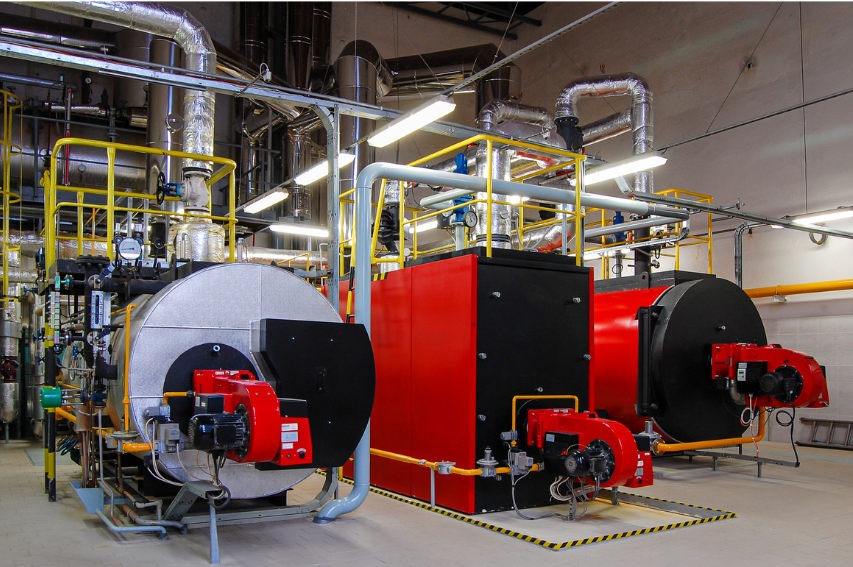
Boilers in the American Manufacturing Industry: Balancing Cost and Product Quality
The American manufacturing industry relies heavily on boilers as integral components of production processes. In this section, we delve into the significance of boilers for manufacturers in America, exploring the delicate balance between cost considerations and ensuring high-quality products. Manufacturers across various industries heavily depend on boilers to provide the necessary heat or steam required for their production processes. Boilers are a significant investment for manufacturers, as they not only impact operational efficiency but also play a crucial role in product quality and consistency. For American manufacturers, striking a balance between cost and product quality is essential. While cost considerations are crucial for businesses to maintain profitability and competitiveness, compromising on the quality of the final product can lead to customer dissatisfaction and reputational damage.
When it comes to boiler selection, manufacturers must evaluate their specific production needs and requirements. Factors such as the desired steam or heat capacity, temperature control, and fuel efficiency need to be carefully considered. By conducting a thorough analysis of their manufacturing processes, manufacturers can choose the appropriate boiler type and size that aligns with their production demands.
While cost is an important consideration, American manufacturers also prioritize the long-term operational cost of boilers. Energy efficiency is a critical factor in this regard, as it directly impacts the overall operational expenses associated with boiler usage. Energy-efficient boilers help manufacturers reduce fuel consumption, minimize waste, and lower energy bills. By investing in high-efficiency boiler systems, manufacturers can achieve significant cost savings over the life of the equipment.
Moreover, American manufacturers recognize the importance of product quality and consistency in meeting customer expectations. Boilers play a vital role in ensuring the desired product characteristics, such as precise temperature control in food processing or optimal conditions for chemical reactions. Reliable and well-designed boilers contribute to maintaining consistent product quality, minimizing rejects, and enhancing overall customer satisfaction.
In the American manufacturing industry, manufacturers often seek partnerships with reputable boiler manufacturers. Collaborating with trusted suppliers who understand their unique requirements and can provide customized boiler solutions is paramount. Reputable boiler manufacturers offer not only high-quality products but also comprehensive after-sales support, maintenance services, and spare parts availability, ensuring the longevity and optimal performance of the boiler systems.
To achieve a balance between cost and product quality, American manufacturers also consider the total cost of ownership (TCO) of boilers. TCO analysis takes into account the initial investment, operating costs, maintenance expenses, and expected lifespan of the boiler system. By evaluating TCO, manufacturers can make informed decisions that consider the long-term financial implications and ensure the best value for their investment.
Boilers hold a crucial position in the American manufacturing industry, impacting both cost considerations and product quality. American manufacturers strive to strike a delicate balance between managing costs and ensuring high-quality products. By selecting the appropriate boiler systems, prioritizing energy efficiency, seeking reputable suppliers, and conducting thorough TCO analysis, manufacturers can optimize their production processes, reduce operational expenses, and meet customer demands for high-quality products. Through this equilibrium, American manufacturers can thrive in a competitive market while delivering value to their customers.
